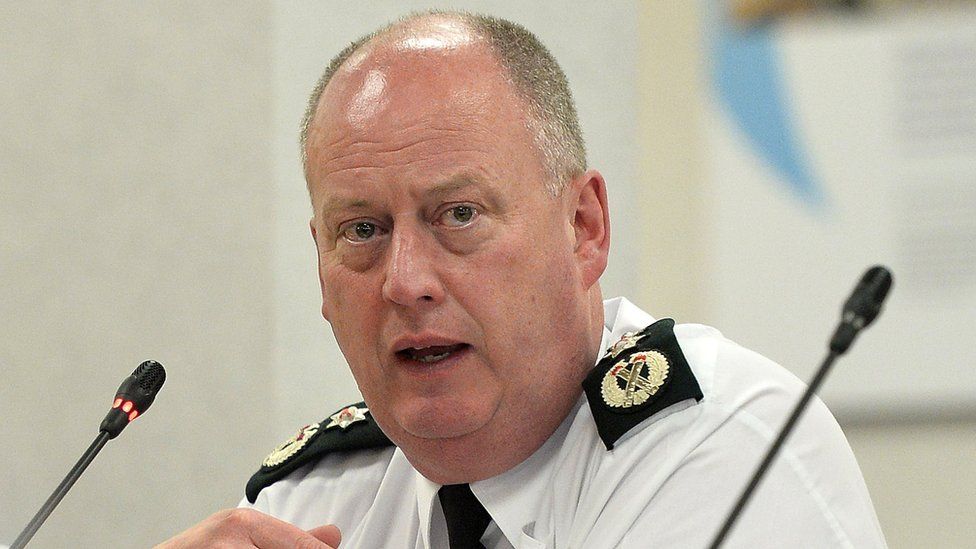
Sir George Hamilton left his role as PSNI chief constable in 2019
By Michael Bedwell
BBC News NI
A former PSNI chief constable has said the service is “crying out for leadership” and that a key Policing Board decision was making things worse.
Sir George Hamilton said it was “painful to watch” the ongoing leadership crisis within the PSNI.
Simon Byrne resigned earlier this month after a number of controversies.
Sir George said a decision by the Policing Board not to appoint a formal interim or acting chief constable showed a “failure of leadership”.
Mr Byrne had succeeded Sir George as chief constable in 2019.
The Policing Board, which oversees the Police Service of Northern Ireland (PSNI), said Deputy Chief Constable Mark Hamilton would “exercise all the functions of the chief constable” until a successor is appointed.
“This fudge that the policing board have come up with is actually exacerbating the leadership deficit at the top of the PSNI,” he told BBC NI’s The View.
“There are thousands of officers and staff there who want to be led and they need to know who the figurehead is and that is important to put somebody in place even in an interim period who has the ability and confidence of the organisation to take it forward through this crisis.”
On Wednesday, the PSNI confirmed Mr Hamilton remained absent from work following a medical procedure.
Day-to-day leadership is in the hands of the PSNI senior executive team in his absence, a police spokesperson said.
Mr Byrne resigned last week, four years after he was appointed to Northern Ireland’s top policing job.
In a statement, he said it was “now time for someone new to lead this proud and resolute organisation”.
Image source, PA Media
Simon Byrne succeeded Sir George Hamilton as the PSNI chief constable in 2019
Pressure had been mounting on Mr Byrne following a number of controversies.
A court last month ruled two junior officers were unlawfully disciplined following an arrest at a Troubles commemoration in February 2021.
The event was marking the anniversary of the 1992 Sean Graham bookmakers attack in south Belfast where five people were murdered and nine others injured by loyalist paramilitaries.
Mr Byrne said he was considering an appeal against the ruling.
Image source, Pacemaker
Deputy Chief Constable Mark Hamilton was placed in temporary command until a new chief constable is in post
Democratic Unionist Party (DUP) Policing Board member Trevor Clarke said problems with the PSNI’s leadership were inherited by the former chief constable.
“These are not new within the organisation and those are some of the things that we’re trying to resolve now… with picking a new chief constable,” he told BBC Radio’s Good Morning Ulster programme.
Mr Clarke said the board did not rush the decision not to introduce an interim leader, and based it on legal and HR advice.
“Let’s not lose the fact the process has started, that the new chief constable will be appointed in November,” he added.
“To suggest that we can bring in someone in the interim is a difficult position or prospect for anyone at this moment.”
Responding to comments made by Sir George, Mr Clarke said “George isn’t in receipt of the full facts, and maybe if he was he would come to a different determination”.
He added that the board is “working around the clock” to bring in fresh leadership to move the organisation forward.
Political input ‘welcomed’
Last month, a number of data breaches came to light, including one where the names and details of the PSNI’s 10,000 officers and civilian staff were published in error as part of a Freedom of Information request.
Some of the information included the rank or grade of employees, where they are based and the unit in which they work.
When asked if he had been put under political pressure during his time as chief constable Sir George said he “welcomed engagement from senior political figures”.
“I don’t think politicians advocating for a certain position is this issue here, it’s how the senior executive police leadership team respond to that,” he added.
“The chief constable should not have been allowing himself to be influenced operationally.
“There is a difference between taking peoples perspective and building that into the decision making and actually jumping straight to placate someone.”
You can watch the exclusive interview with Sir George Hamilton on The View on Thursday at 22:40 BST on BBC One Northern Ireland, and BBC iPlayer.
The interview will also be published on the Red Lines podcast on BBC Sounds.








